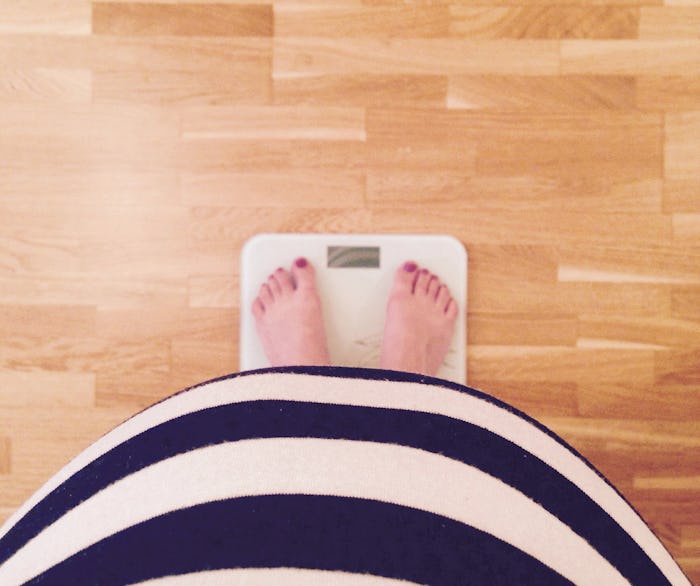Life

7 Myths About Pregnancy Weight Gain That Society Should Ignore For Good
When you're pregnant, you know that gaining some weight is a part of the process. But as your belly grows, you may be wondering when your back will stop hurting or if you'll ever see your toes again. To top it off, you're probably receiving lots of unsolicited advice from friends and relatives about your pregnancy weight. But you should know that there are plenty of myths about pregnancy weight gain out there, and all of them should be taken with the tiniest grain of salt.
You've probably been told that you're eating for two, that you can gain as much weight was you want, and that all you need to do is breastfeed to see your pregnancy weight melt off. But these statements aren't entirely true. Although it's perfectly OK to give in to those milkshake cravings every once in a while, you shouldn't go overboard. After all, gestational diabetes and preeclampsia are just a few of the potentially dangerous consequences of gaining an unhealthy amount of weight during pregnancy. Make sure to work with your doctor to determine a healthy range of weight to gain during your pregnancy, and do your best to stay within those guidelines.
Once your baby is born, be patient with yourself about taking the weight off. The first few months are going to require a lot of energy, and all new moms should maintain a healthy diet and level of exercise to keep them going.
Myth #1: You Have To Eat For Two
You may have been told that you're eating for two, but don't use pregnancy as an excuse to eat everything you see. According to the Cleveland Clinic, expectant mothers only need to add an extra 300 calories to their diet during pregnancy, which only adds up to a couple of small snacks each day. Work with your doctor to plan an ideal diet that is realistic for your body.
Myth #2: You Can Gain As Much Weight As You Want During Pregnancy
Let's face it, you're going to gain weight over the next nine months. But gaining too much weight can put mothers at risk for gestational diabetes and preeclampsia. A woman of average weight should gain approximately 25 to 35 pounds during pregnancy, according to WebMD. However, this is certainly not a one-size-fits-all rule. Your doctor can help you determine a realistic and healthy amount of weight to gain during your pregnancy. Use this as a guide and try not to obsess about the numbers on the scale. After all, you are growing a human in there
Myth #3: Breastfeeding Will Make You Lose Weight
Although it's true that you will naturally burn calories while breastfeeding, weight loss shouldn't be your only reason to nurse. Simply breastfeeding is not enough to help you shed the pounds. According to What to Expect, breastfeeding moms need to consume more calories in the first six months postpartum than they did in the last trimester of their pregnancy. They recommend adding an average of 500 calories to your daily diet.
Myth #4: You Shouldn't Work OutWhile Pregnant
If you and your doctor are in agreement, being active while pregnant is perfectly OK. Northwestern Memorial Hospital suggests expectant mothers maintain a safe level of exercise. Whether you bike, swim, take a yoga class, or just walk around your neighborhood, a small amount of exercise can make a huge difference in helping you manage your stress and stabilize your mood. And as an added bonus, staying active may even help shorten the duration of your labor.
Myth #5: You Should Start Dieting As Soon As The Baby Is Born
Avoid the temptation to go on a crash diet after the birth of your baby. You're going to need all of your strength and nutrition to fight off infection and feed your baby. Not to mention you have way more important things to worry about. According to What to Expect, new moms should not attempt to start a diet until the baby is at least six weeks old. In reality, you should allow the weight to come off slowly and when you're ready.
Myth #6: Don't Worry About Losing Weight After Giving Birth If You're Going To Have Another Child Right Away
Even if you're planning on getting pregnant again right away (after you wait six weeks to heal before having sex again, of course), it's healthier for you and your baby if you try to lose the weight you gained with your first pregnancy. According to The Institute of Medicine of the National Academies, having another baby before you've lost weight can contribute to problems with your delivery.
Myth #7: Fat Is The Enemy
Don't be so quick to slash calories and fat from your diet when your baby is born. A new mom needs to maintain a well-balanced diet to care for her baby. What to Expect recommended lean meat, fish, nuts, and avocado as great examples of unsaturated fats (the good kind) to add to your daily menu. According to Women's Health, foods that are rich in fiber and protein will give mom the energy she needs while helping her maintain a stable mood.